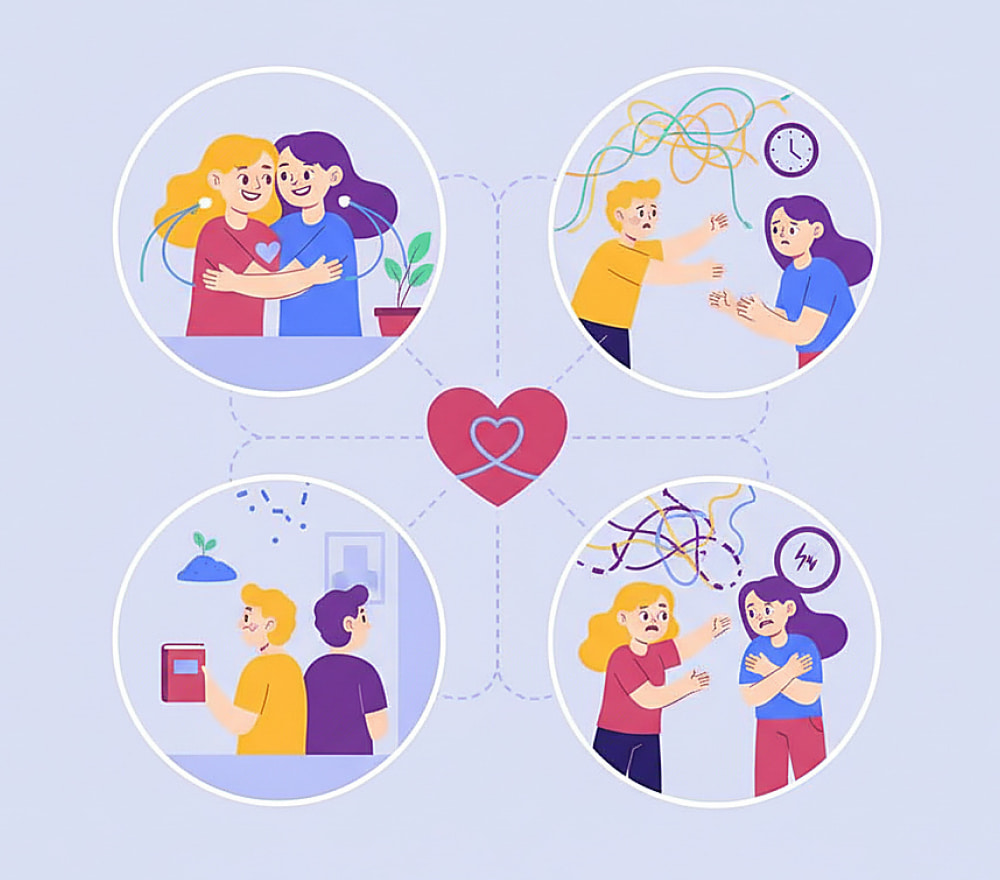Discovering Your Attachment Type: an In-Depth Guide

Discover Different Attachment Styles
Get StartedUnderstanding your attachment type can profoundly influence how you engage in relationships. Whether in romantic partnerships, friendships, or familial bonds, your attachment style plays a crucial role in your social and emotional life. By learning more about this concept, you can foster healthier, more fulfilling connections with others.
The Essence of Attachment Theory
At the heart of this discussion lies attachment theory types, a psychological model developed by John Bowlby and Mary Ainsworth. It explains how individuals form emotional bonds and different types of relationships throughout their lives. From early childhood, our interactions with caregivers lay the foundation for how we bond with others.
Attachment theory posits that our early experiences shape our adult relationship behavior. These patterns often manifest in the way we communicate, show affection, and handle conflicts. Understanding the different types of attachment can pave the way for personal growth and self-awareness. By delving into these theories, you can learn to identify and address underlying concerns that may arise in interpersonal connections.
Identifying the Four Attachment Types
One of the pivotal aspects of attachment theory involves identifying the four types of attachment: secure, anxious, avoidant, and disorganized. Recognizing these patterns sheds light on how we connect with others.
- Secure Attachment: Individuals with this style often feel confident in relationships and have a stable bond with their partners.
- Anxious Attachment: This style is characterized by a strong desire for closeness, often accompanied by worry about the relationship's status.
- Avoidant Attachment: People with this style may struggle with intimacy and prefer emotional distance.
- Disorganized Attachment: This type combines features of both anxious and avoidant styles, often leading to unpredictable behavior in relationships.
By understanding the 4 types of attachment styles, you can gain insights into your emotional needs and relationship expectations.
Benefits of Taking an Attachment Type Quiz
Engaging with an attachment type quiz can be an eye-opening experience. It serves as a tool for self-discovery, helping you uncover patterns in your interpersonal dynamics. Quizzes are designed to evaluate your behaviors and preferences, offering a snapshot of your attachment style. They prompt you to reflect on how you interact with others, making it easier to cultivate stronger connections.
Such quizzes can also highlight potential areas for improvement in your relationships. By becoming aware of your tendencies, you can work towards healthier interactions. Understanding the different types of attachment styles can transform how you view and approach your relationships. Taking this time to explore within can promote mindfulness and intentionality in building more balanced connections.
Relationship Dynamics and Attachment Styles
The types of attachment styles in relationships greatly influence how couples and friends function together. Securely attached individuals, for example, tend to maintain steady, successful relationships. On the other hand, those with insecure styles might find themselves in cycles of conflict or misunderstanding.
Learning about your personal attachment style through an attachment type test can enhance your personal development journey. It encourages introspection and helps in identifying patterns that might not be serving you. Ultimately, understanding the different attachment types equips you with the knowledge to foster healthier bonds in your life.
Attachment Styles and Their Impact
Research into four types of attachment styles demonstrates notable differences in conflict resolution, communication patterns, and emotional expression. For instance, those with a secure attachment are often more open to discussing issues without fear of criticism. In contrast, individuals with types of insecure attachment styles might avoid conflict or become overly dependent in stressful situations.
| Attachment Style | Communication | Conflict Resolution |
|---|---|---|
| Secure | Open and honest | Collaborative |
| Anxious | Need for reassurance | Conflict-averse |
| Avoidant | Reserved | Defensive |
| Disorganized | Inconsistent | Unpredictable |
FAQ About Attachment Type Testing
- What is the purpose of an attachment type quiz?
An attachment type quiz helps you identify your attachment style, offering insights into how you connect and relate to others.
- How reliable are attachment style quizzes?
These quizzes can provide valuable self-reflection, but they should be treated as an initial step rather than a professional diagnosis.
- Can attachment styles change over time?
Yes, with self-awareness, effort, and healthy experiences, individuals can shift toward more secure attachment styles.
- Are there professional tools for assessing attachment types?
Yes, psychologists use structured interviews and validated questionnaires for accurate attachment assessments.
- How does understanding my attachment style benefit relationships?
Recognizing your relationship attachment style helps improve communication, resolve conflicts, and build stronger connections.
